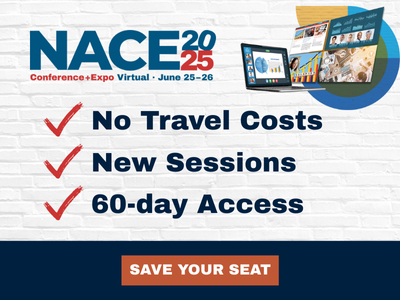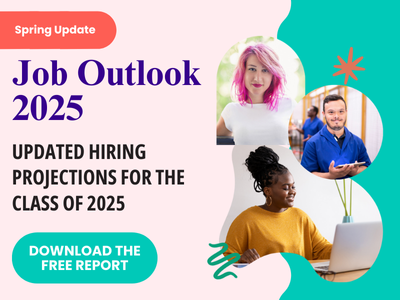Skill development and early engagement are key priorities of New York University’s (NYU’s) Wasserman Center for Career Development. It addressed both of these priorities by developing a program that embedded career readiness competencies in a course for first-year students.
“Since common first-year experiences for NYU students are rare, we merged a mandatory first year wellness course—RADical Health—with an optional Career Accelerator Certificate that trains students on Violet Ready skills, which are based on the NACE competencies and are transferable skills that employers seek in candidates” says Victoria DiMonica, associate director of undergraduate career development in the Wasserman Center.
2022 NACE AWARD WINNER
The New York University Wasserman Center for Career Development is the large college co-winner of the 2022 NACE Award for Career Services Excellence for its work embedding skill development in a first-year wellness course through its Career Accelerator Certificate. For more information about the NACE Awards program and the full list of award winners/honorable mentions, see www.naceweb.org/about-us/nace-awards/.This innovative collaboration exposes students to resources and career readiness skills through a dynamic, interactive course. More than 350 students completed career assignments each week with an incentive of the certificate after the course.
“This was the first time we piloted a certificate, and it was a success,” DiMonica says.
Gracy Sarkissian, executive director of the Wasserman Center, notes that many first-year students do not enter college with the social capital to navigate the university, especially how and when to use the career center.
“To level the playing field, career support should be embedded into the academic curriculum,” Sarkissian explains.
“However, NYU does not offer one common first-year class designed for students across schools and departments. We had to think creatively about how to expose students to career resources and skill development early in their time at NYU—a goal that would help all students build a strong career foundation, regardless of their existing network or social capital.”
Wasserman Center staff aimed to incorporate career resources and skill development in a common first-year experience, NYU’s RADical Health course. The course was required for all first-year students living on campus and served as an entry point into career development for students across academic programs and disciplines.
“Embedding career assignments directly into the curriculum allowed the Wasserman Center to expose more students to the Violet Ready skills framework,” says Nia Beresford, manager of undergraduate career development in the Wasserman Center.
“Prior to this initiative, skill development was only embedded into the Wasserman Center’s programming, which might only reach 50 students at a time. Through this initiative, students were able to learn about career resources without needing to step foot inside the career center itself. This provided first-year students with the same foundation, regardless of their starting point, leading to greater equity in access to career support.”
DiMonica says that by designing optional career assignments incentivized by a certificate, the Wasserman Center aimed to encourage students to opt in—rather than be required—to engage with career development early in their college education.
“The simple assignments allowed them to engage directly with four major career resources, knowledge that will continue to serve them throughout their time at NYU,” she says.
“This was also the first time we used a certificate as an incentive for completing career assignments. We were testing the idea of using an incentive without investing in a credentialing platform. We conducted the pilot with zero dollars spent.”
The Wasserman Center embedded the Violet Ready skills into RADical Health classes for first- year students in fall 2021.
RADical Health is an interactive four-week program that provides students with critical wellness resources in a cohort setting, empowering them to conquer the semester with confidence and peer connections.
“On the surface, career services and RADical Health seem unrelated,” Sarkissian says.
“However, this innovative collaboration demonstrated the benefits of introducing skill development within non-traditional career courses. Ultimately, this approach reaches students who may not have engaged with career resources in their first year.”
All 2,807 students who participated in the RADical health course were introduced to one Violet Ready skill each week by their instructor, related to that week’s wellness content. The four Violet Ready skills embedded in the curriculum were reflection, self-awareness, communication, and collaboration.
After each class, students were invited to complete a career-related assignment. Students who finished the four assignments received a “Career Accelerator” certificate. The homework assignments and certificates were both opt-in; 373 first-year students completed all four career assignments and received the certificate.
Wasserman Center staff collected data on completion of assignments and asked students to outline their career-related next steps after this course. Nine themes emerged from that data, such resume building, applying to internships, meeting with a career coach, and networking.
Two months after completing the course, Wasserman Center staff sent a survey to students who received the certificate to determine how they have engaged with career services since participating in the course, as well as their satisfaction with the certificate incentive in general. Staff also offered these students an optional 15-minute interview to collect qualitative feedback.
The survey and interviews found that 90% of students agreed that participating in the Career Accelerator activities made them think about their career development or path beyond NYU.
In addition, two months after completing the course, students engaged with the Wasserman Center or their career development in several ways, such as:
- 31% explored additional Wasserman resources;
- 22% worked on a resume or cover letter;
- 14% joined a club or took a volunteer opportunity; and
- 12% applied for a job or internship.
“This was the first time Wasserman incorporated the Violet Ready skills into an academic class,” Beresford says.
“Due to its success, the center is exploring future collaborations to weave skill development and career readiness into additional university initiatives and courses as a best practice.”
This year, the RADical health course and career accelerator certificate will be optional; however,
the program will be open to all incoming first-year students, including those living on and off campus. In addition, while all RADical health classes were virtual in 2021, the program will be offered in a hybrid format this fall.
“We are excited that the opportunity is now open to even more students and we are curious
to see how these changes will impact student participation and engagement,” Beresford says.
Adds Sarkissian: “This unique collaboration between the Wasserman Center for Career Development and Student Wellness exemplifies NYU’s commitment to holistic student development and has served as a model for broader division-wide collaborations at NYU. We are currently working with colleagues across the institution on leadership development, experiential learning, well-being, and community development.”
Sarkissian, DiMonica, and Beresford offered several recommendations to their colleagues considering developing a similar program:
- Leverage the wealth of expertise that exists across your campus. Collaborate with colleagues or initiatives that target the students you want to reach, such as a program that targets first-year students, so you can expose them to career development early in their college experience.
- Partner with a program or course that engages students from a variety of majors, which will allow you to reach a broader group of students.
- Consider working with non-traditional partners who don’t typically work in the career space (like this wellness course). This approach enables you to reach students who may not seek out career support or engage with career resources early in their college experience.
- Develop strategies that enable you to meet students “where they are,” but that can also be scaled to reach a variety of students at the same time. Have options for students to engage as deeply with the content as they choose depending on their stage in the career development process (exposure, learning, experiencing, and more). Optional deep dive assignments (choose your own adventure) and an incentive works well for this.
“Also, don’t be afraid to try something new, explore non-traditional partnerships, and step out of your comfort zone,” Sarkissian adds.
“As student-centered career professionals, it’s important to identify creative ways to expand our reach and our impact.”







